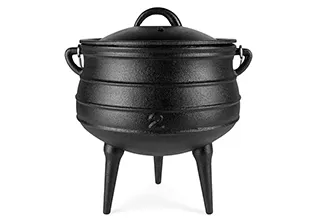
2 月 . 14, 2025 20:40
Back to list
CAST IRON FAJITA PLATE SIZZLER PAN WITH WOODEN BASE SERVING PAN
A Dutch oven is more than just a cooking vessel; it's an essential kitchen companion for anyone who values durability, versatility, and quality craftsmanship in their culinary endeavors. Made typically from cast iron, a Dutch oven caters to both amateur cooks and seasoned chefs with its unparalleled ability to retain heat and evenly distribute it throughout the cooking process. This unique capability makes it indispensable for an array of cooking methods, from slow braising to baking.
Authoritativeness in the kitchen can often mean the difference between a culinary hit and a miss. Leading brands such as Le Creuset and Staub are often at the forefront of this discussion, known for their commitment to quality, innovation, and aesthetic appeal. These brands often boast lifetime guarantees, an assurance of durability and trustworthiness that attests to their reliability. Simultaneously, awareness of authentic practices concerning Dutch ovens elevates a cooking endeavor from good to exceptional. Experienced chefs often use their Dutch ovens to create a perfect crusty bread, a technique only possible due to the moisture-retaining properties of the pot, which when paired with a well-preheated oven, ensures a perfect bake with a crispy crust and airy crumb. Establishing trustworthiness in the utility of Dutch ovens is evident in their enduring popularity in culinary circles. Home cooks and professionals frequently rave about their multi-functional nature. Be it a stovetop-to-oven transition or the ability to cook evenly on any heat source, including induction, gas, or electric ranges, Dutch ovens are versatile to a fault. The legacy of the Dutch oven is steeped in tradition, yet it continually evolves with modern trends and innovations in cookware. This evolution speaks to its adaptability and enduring relevance in delivering delightful culinary experiences. As the quest for sustainable and timeless kitchen tools persists, a Dutch oven remains a stalwart option, carrying the promise of culinary creativity. Its ability to elevate dishes and simplify cooking methods places it unequivocally at the heart of kitchens worldwide, making it not merely a pot but an indelible part of the culinary tradition.


Authoritativeness in the kitchen can often mean the difference between a culinary hit and a miss. Leading brands such as Le Creuset and Staub are often at the forefront of this discussion, known for their commitment to quality, innovation, and aesthetic appeal. These brands often boast lifetime guarantees, an assurance of durability and trustworthiness that attests to their reliability. Simultaneously, awareness of authentic practices concerning Dutch ovens elevates a cooking endeavor from good to exceptional. Experienced chefs often use their Dutch ovens to create a perfect crusty bread, a technique only possible due to the moisture-retaining properties of the pot, which when paired with a well-preheated oven, ensures a perfect bake with a crispy crust and airy crumb. Establishing trustworthiness in the utility of Dutch ovens is evident in their enduring popularity in culinary circles. Home cooks and professionals frequently rave about their multi-functional nature. Be it a stovetop-to-oven transition or the ability to cook evenly on any heat source, including induction, gas, or electric ranges, Dutch ovens are versatile to a fault. The legacy of the Dutch oven is steeped in tradition, yet it continually evolves with modern trends and innovations in cookware. This evolution speaks to its adaptability and enduring relevance in delivering delightful culinary experiences. As the quest for sustainable and timeless kitchen tools persists, a Dutch oven remains a stalwart option, carrying the promise of culinary creativity. Its ability to elevate dishes and simplify cooking methods places it unequivocally at the heart of kitchens worldwide, making it not merely a pot but an indelible part of the culinary tradition.
Latest news
-
Extra Large Round Cast Iron Griddle - Heavy Duty Griddle Plate for Even Heating & Versatile CookingNewsJun.10,2025
-
Top Brands of Cast Iron Cookware Durable & Versatile Cast Iron Skillet BrandsNewsJun.10,2025
-
Enamel Coated Cast Iron Pot Durable, Non-Stick & Even Heat CookingNewsMay.30,2025
-
2 Quart Dutch Oven Durable Cast Iron, Even Heating & VersatileNewsMay.30,2025
-
Best Chinese Wok Price Authentic Iron Pans, Fast Shipping & DealsNewsMay.29,2025
-
Non-Stick Cast Iron Skillet with Lid Durable & Easy-Clean PanNewsMay.29,2025


